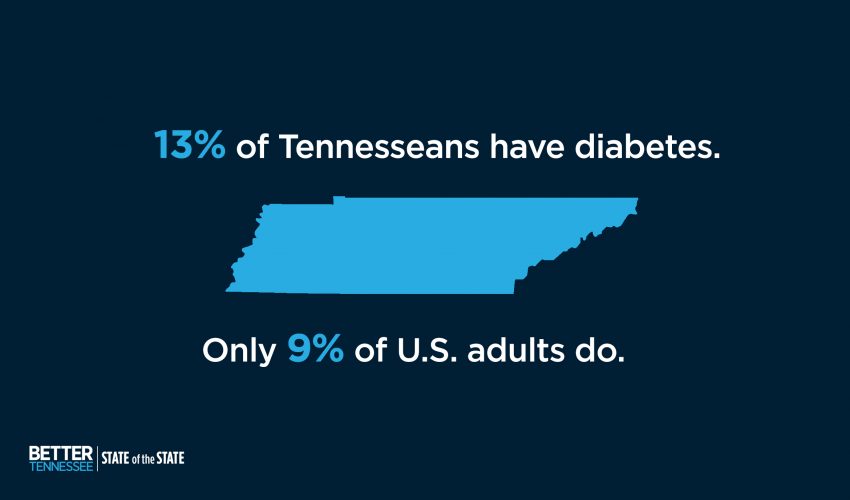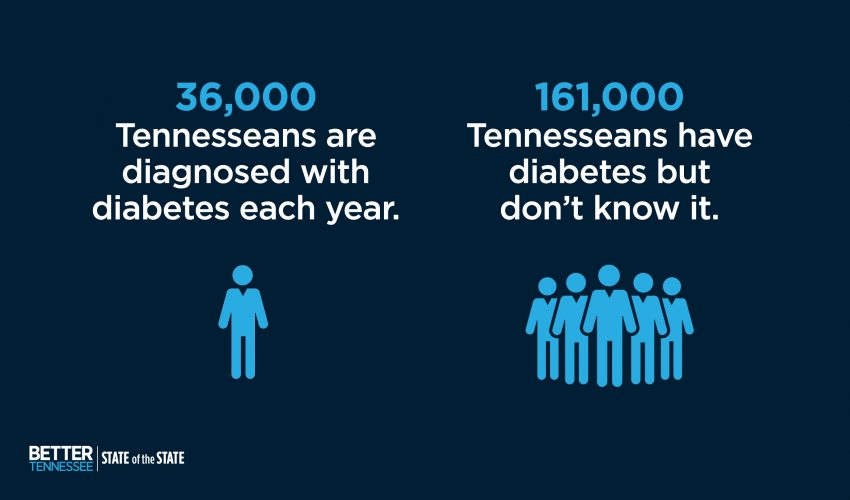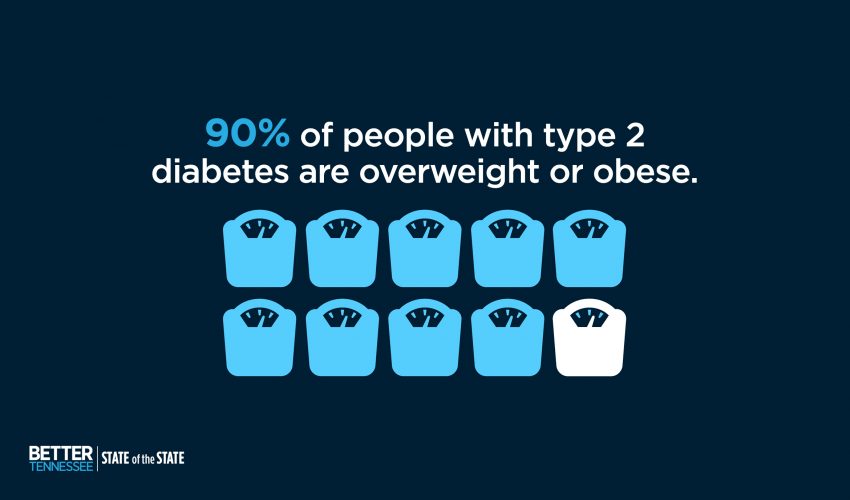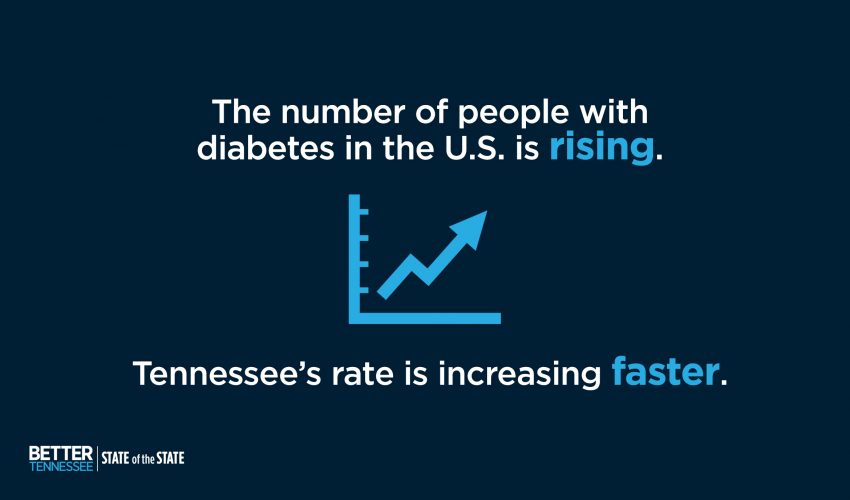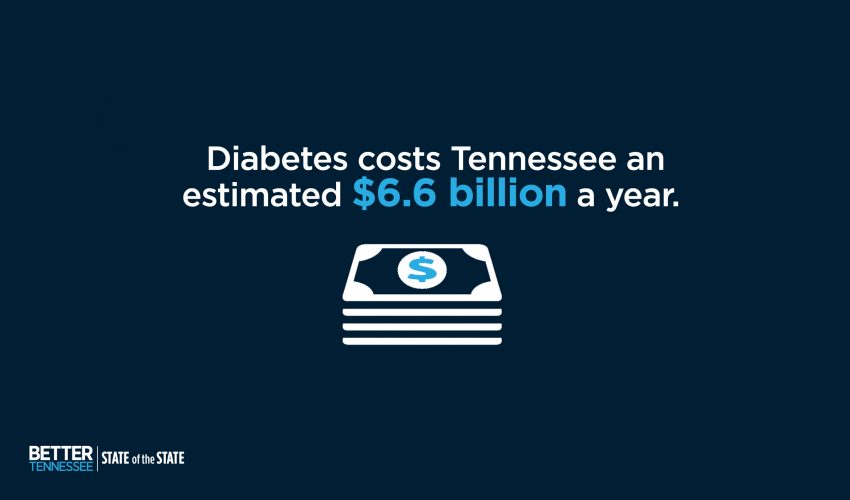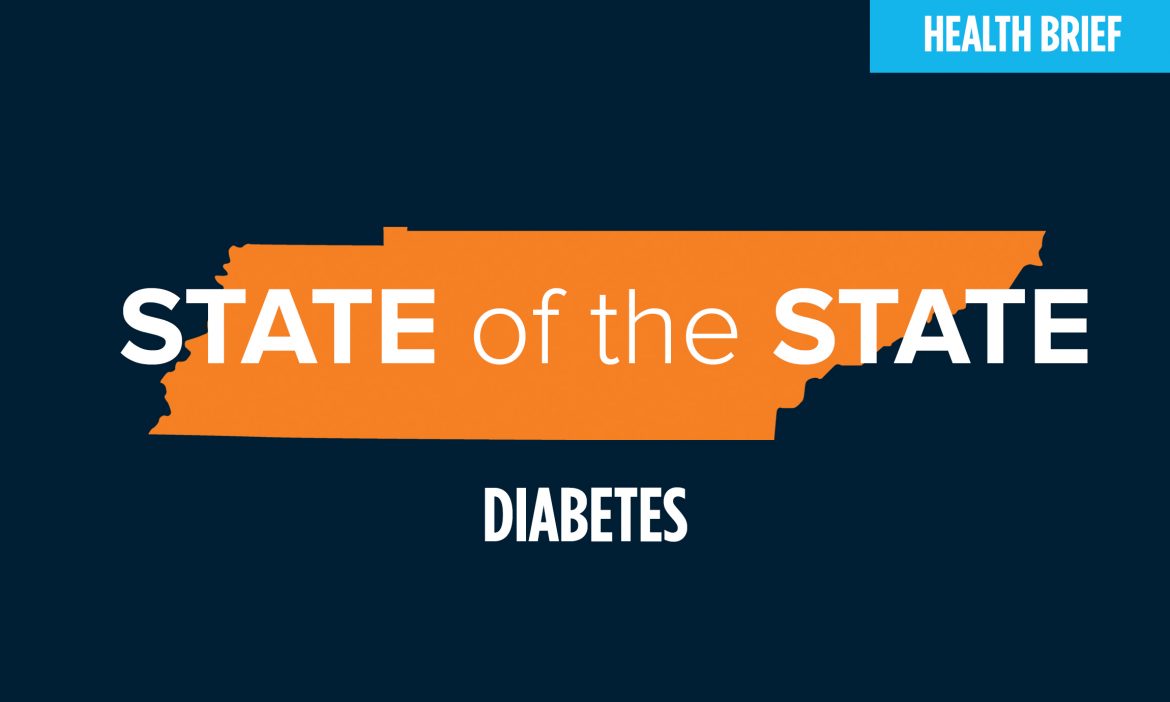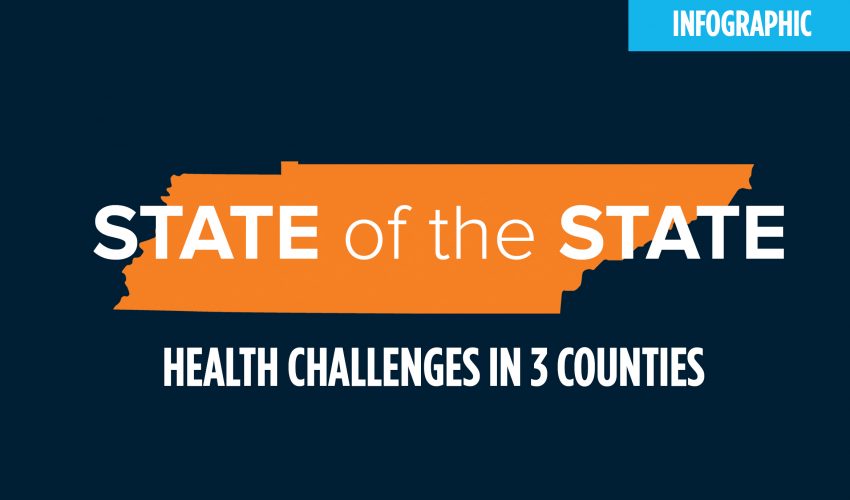Updated May 5, 2017
Health briefs offer quick but comprehensive information about some of the biggest health challenges Tennessee is facing.
Scroll down to read all about diabetes in our state or jump to a specific section:
Nearly 13% of adults in Tennessee have diabetes. Only 9% in the U.S. do.
36,000 Tennesseans are diagnosed with diabetes each year.
161,000 Tennesseans are estimated to have diabetes but don’t know it.
9 out of 10 people with type 2 diabetes are overweight or obese.
86 million Americans have pre-diabetes, a condition which puts them at risk to develop full-blown type 2 diabetes.
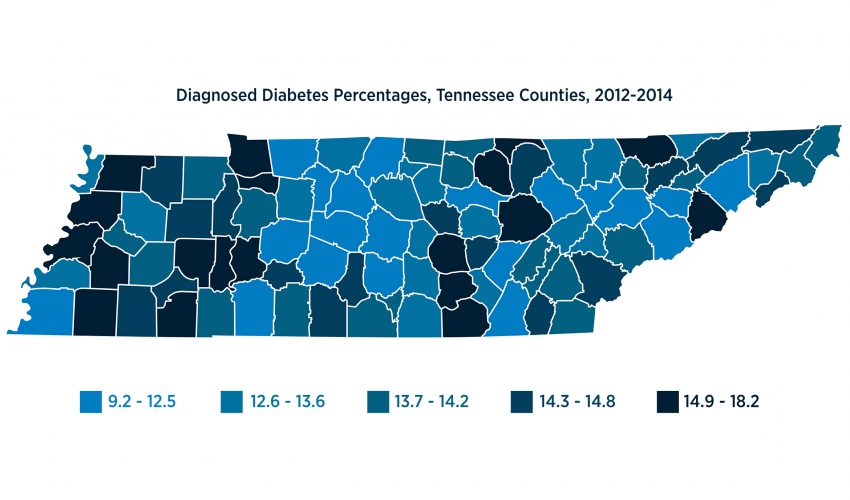
What is diabetes?
Insulin is a hormone that helps the body absorb blood sugar (glucose) to be used as energy.
People with diabetes are either unable to produce or unable to use insulin, causing glucose to stay in the blood rather than fuel the body’s cells.
Eventually, glucose levels that are too high (hyperglycemia) can damage the vessels that supply blood to vital organs.
That, in turn, can increase a person’s risk of:
- Heart disease
- Stroke
- Kidney disease
- Vision problems
- Nerve problems
Diabetes is the leading cause of:
- Blindness
- Kidney failure
- Amputations
- Heart failure
- Stroke

Nashville’s Faith Family Medical Center sees roughly 3,500 patients per year, and 50% have diabetes, obesity or hypertension. Click the photo to learn how they treat it through creative tactics like gardening.
What is the difference between type 1 and type 2 diabetes?
Type 1 diabetes
About 5% of people with diabetes have type 1 diabetes, in which the body does not produce insulin.
Type 1 diabetes is usually diagnosed in children and young adults, and is treated using daily insulin shots or an insulin pump, and managing blood glucose levels through diet.
Type 1 diabetes is an autoimmune disease and is not preventable.Type 2 diabetes
Type 2 diabetes is the most common form of diabetes, making up 95% of all diagnoses.People with type 2 diabetes have what is called insulin resistance.
Their bodies do produce insulin, but:
- It’s not processed properly or
- There isn’t enough produced to keep blood sugar levels normal.
By keeping a healthy weight, the chances of preventing type 2 diabetes are increased. Once it does develop it must be managed through diet and exercise. In some cases, insulin injections are needed.
Pre-diabetes
People with pre-diabetes have higher than normal blood sugar levels and are at risk to develop type 2 diabetes if they don’t address it.
Pre-diabetic patients may be able to stop the full onset of diabetes by losing weight and exercising regularly.

Read about how Volunteers in Medicine in Chattanooga addresses all the reasons people may become diabetic, including access and affordability.
What are the risk factors for diabetes?
90% of people with type 2 diabetes are overweight or obese.
Other risk factors include:
- Age of 45+
- Family history of diabetes
- Gestational diabetes (diabetes during pregnancy) or giving birth to a baby weighing more than 9 lbs.
- High blood pressure
- No physical activity
How common is diabetes?
In the U.S.
Diabetes is the 7th leading cause of death in the U.S.- More than 29 million Americans — 1 out of every 11 people — have diabetes.
- More than 8 million of those people are undiagnosed, which means one in four people with diabetes does not know they have it.
- 86 million Americans have pre-diabetes.
- More than 5,000 U.S. youths (under age 20) are diagnosed with type 2 diabetes each year.
According to the 2017 BCBS Health Index Report, diabetes has a greater negative health impact than lung disease (COPD), breast cancer, and asthma combined.
The impact of diabetes is increasing most rapidly in those ages 18-34, a group that is experiencing the greatest growth in obesity rates. Obesity is a key contributor to diabetes.
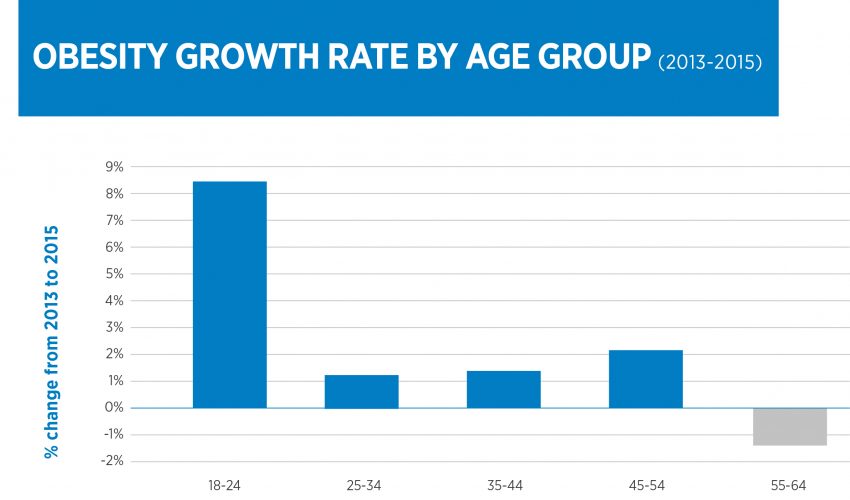
The diabetes belt
The Southeastern U.S. is home to what the CDC calls the “diabetes belt,” which is made up of:
- 644 counties
- In 15 states (including Tennessee)
- Where at least 11% of residents have been diagnosed with diabetes.
The health impact of diabetes on the Southeast and Central South is 50% higher than the national average.
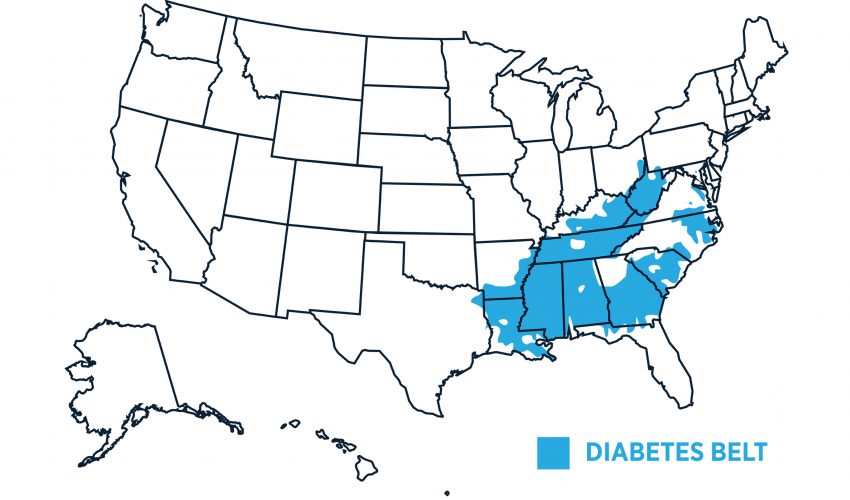
In Tennessee
Tennessee has the 5th highest rate of diabetes in the U.S.- 650,000 adults in Tennessee (13% of the population) have been diagnosed with diabetes.
- 161,000 adults in Tennessee have diabetes but do not know it. 1.7 million adults in Tennessee have pre-diabetes (36%).
Increase
The rate of diabetes for Tennesseans age 45-64 has jumped from about 14% in 2011 to almost 18% in 2014.
While the number of people with diabetes in the U.S. is rising, Tennessee’s rate is increasing faster.
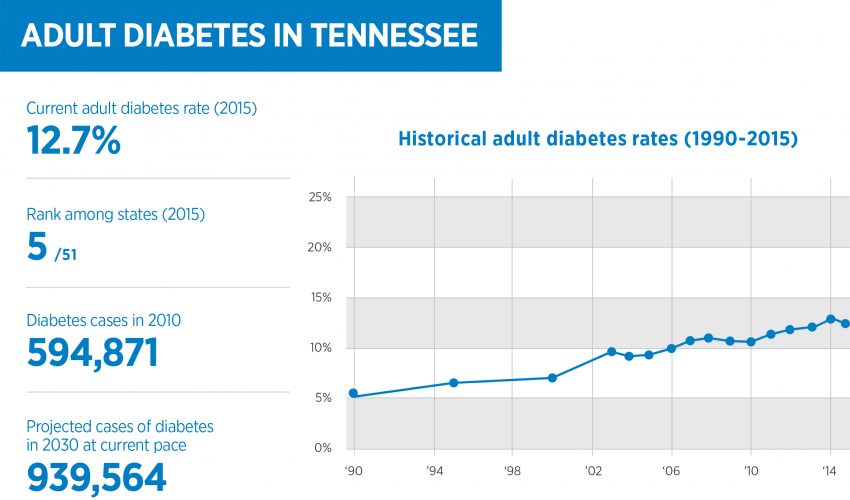
source: stateofobesity.org
How much does diabetes cost?
In the U.S.
In 2012, the medical costs and lost wages for diabetics totaled $245 billion.
Medical costs for people with diabetes are TWICE the cost of those who do not have the condition.
In Tennessee
Diabetes costs Tennessee an estimated $6.6 billion a year.
Medical expenses in the state for both diagnosed and undiagnosed diabetes, pre-diabetes and gestational diabetes cost $4.9 billion.
Tennessee has $1.7 billion of lost productivity annually due to diabetes.How can type 2 diabetes be prevented?
The CDC’s Diabetes Prevention Program has been shown to cut the risk of developing type 2 diabetes in half.
Pre-diabetics learn how to transition to healthier eating habits and increased physical activity.
Lifestyle changes from the CDC program reduced type 2 diabetes risk by 58% for pre-diabetics.
As of 2016
- There were 22 locations in Tennessee offering the program.
- They had 2,021 participants enrolled with 237 completing the full year of 16 sessions.
- Those who completed the program lost an average 6.5% of their starting weight.
How is BlueCross addressing diabetes?
The BlueCross BlueShield of Tennessee Health Foundation provided a $325,000 grant to the Faith Family Medical Center in Nashville to support its Journey to Health program.
BlueCross educates members about how to make smart choices and empowers them to get the right maintenance and preventive care. That work includes promoting regular screenings and personalized support from care managers.
INFOGRAPHICS
